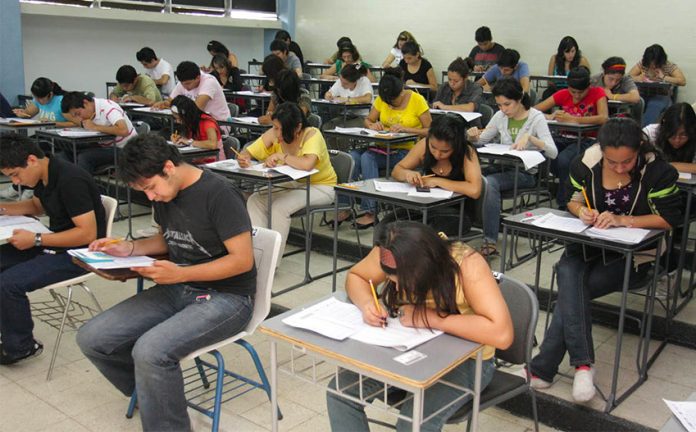Mexican 15-year-olds rank last among students in the 36 OECD member countries in mathematics, reading and science, according to the results of the 2018 Program for International Student Assessment (PISA) survey.
Published on Monday, the PISA results show that 35% of Mexican students did not achieve the minimum level of proficiency (Level 2) in all three subjects whereas the average among OECD countries was 13%.
Only 1% of students performed at the highest level of proficiency (Level 6) in at least one subject whereas the OECD average was 16%.
In math, 44% of Mexican 15-year-olds attained proficiency of Level 2 or higher whereas the OECD average was 76%.
The PISA report said that “at a minimum, these students can interpret and recognize, without direct instructions, how a (simple) situation can be represented mathematically.”
Only 1% of Mexican students achieved proficiency of Level 5 or above in the subject compared to 44% in China and 37% in Singapore. Among all 78 countries assessed in the PISA survey, Mexico ranked 61st in math.
In reading, 55% of students attained at least Level 2 proficiency compared to an OECD average of 77%.
“At a minimum, these students can identify the main idea in a text of moderate length, find information based on explicit, though sometimes complex criteria, and can reflect on the purpose and form of texts when explicitly directed to do so,” the PISA report said.
Again, only 1% of Mexican students achieved proficiency of Level 5 or above in the subject compared to an OECD average of 9%. Among all 78 countries assessed, Mexico ranked 53rd in reading.
In science, 53% of 15-year-olds attained at least Level 2 proficiency compared to an OECD average of 78%.
“At a minimum, these students can recognize the correct explanation for familiar scientific phenomena and can use such knowledge to identify, in simple cases, whether a conclusion is valid based on the data provided,” the report said.
A “negligible” percentage of students achieved Level 5 or 6 proficiency in science compared to 7% across OECD countries. Among all 78 countries assessed, Mexico ranked 56th.
Chinese students ranked first in all three subjects. However, the results from the Asian nation are questionable because the PISA survey only assessed 15-year-olds in four large and wealthy cities.
The report said that Mexican boys generally outperformed girls in both math and science, while girls fared better than boys in reading. It also said that socio-economic status was a strong predictor of performance in all three subjects.
Since Mexican students first participated in the PISA survey in 2000, mean performance across the three subjects assessed has remained relatively stable.
“Only PISA 2003 performance (in reading and mathematics) was significantly below 2018 levels, and only PISA 2009 (in mathematics) was significantly above the 2018 level. In all other years, and across all subjects, Mexico’s mean performance was not significantly different from that observed in PISA 2018,” the report said.
However, the overall stability “hides more positive trends amongst the lowest-achieving students,” the report added, explaining that the gap between the top and bottom performers in math and science has shrunk over time in Mexico.
Also on the brighter side for Mexico was that that 83% of students surveyed said they are satisfied with their lives compared to an OECD average of 67%; 85% said that their teachers showed enjoyment in teaching (the OECD average was 74%); and 89% said they can usually find a way out of difficult situations (The OECD average was 84%).
The percentage of Mexican 15-year-olds who said they are bullied at least a few times a month was on par with the OECD average of 23%.
Source: El Universal (sp)
